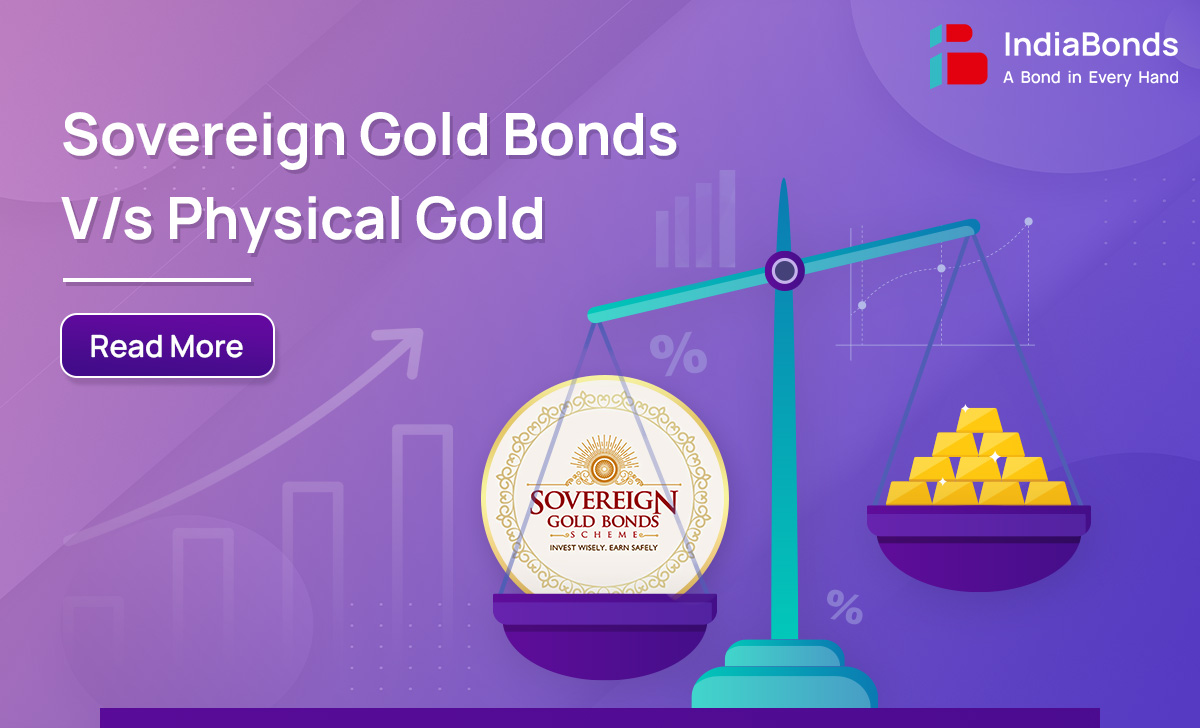
Mankind has treasured gold for thousands of years. The ancient Egyptians used gold for jewelry and decorative items, while the Greeks and Romans used it for coins and other currency. Gold has a special place in human culture and history. It has been used as a symbol of wealth, power, and prestige. People have been known to go to great lengths to obtain gold, including exploration, mining, and even warfare. Today, gold is used for various purposes. The largest use of gold is in jewelry and other decorative items. Gold has always been an attractive investment option for individuals looking for a safe haven asset to hedge against inflation and market uncertainties. However, with the introduction of Sovereign Gold Bonds (SGBs) by the Indian government, investors now have an alternative investment option that offers several benefits over physical gold. Through this article let’s put a rest to the debate between SGB vs physical gold to understand which investment option fares better.
Sovereign Gold Bond is a government-backed investment option that allows investors to buy gold in electronic form. These bonds are denominated in grams of gold and are issued for a fixed tenure of eight years. Investors can purchase these bonds from designated banks, post offices and exchanges. One of the main reasons for the introduction of the sovereign gold bond was to make it easier for investors to invest in gold without having to deal with the hassle of buying physical gold. Another objective of SGBs is to reduce India’s dependence on gold imports.
The interest rate on Sovereign Gold Bonds is currently fixed at 2.50% per annum, payable semi-annually. When held till maturity (i.e. 8 years), you make 20% of the return on your capital even if the price of the gold remains unchanged. The returns are guaranteed by the Government of India, which makes them a safe investment option.
Physical gold comes with the risk of wear & tear, theft and loss. With Sovereign Gold Bonds, there are no storage or security concerns as the gold is held in electronic form in the investor’s demat account.
Sovereign Gold Bonds offer tax benefits to investors. There is no tax liability on the capital gains made on the redemption of these bonds after the 8th year. The interest earned on these bonds is taxable as per the investor’s income tax slab. However, there is no TDS applicable to the interest income of the bond.
Sovereign Gold Bonds are listed on the National Stock Exchange (NSE) and Bombay Stock Exchange (BSE). This makes them a liquid investment option as investors can sell them on the exchange before maturity.
When investors buy physical gold, they have to pay making charges, which can be as high as 10% of the total cost. However, there are no making charges associated with Sovereign Gold Bonds.




| Features | Sovereign Gold Bond | Physical Gold |
| Returns | Current market rate + Interest 20% (2.5% for 8 years) on investment | As per the current market rate |
| Safety | Held in electronic form in the investor’s demat account, which eliminates risks of theft and loss | Physical gold comes with the risk of theft and loss. |
| Purity | Backed by GOI / RBI Gold Reserves | Risk of purity or fraud |
| Taxation | No LTCG, if held till maturity. No TDS on interest income. | Physical gold attracts capital gains tax. |
| Loan Collateral | Accepted | Accepted |
| Tradability / Liquidity | Redeemable after 5 years; Listed on exchanges hence highly liquid | Tradable; Depends on the market price, may not get the required rate |
| Storage | No storage cost, since SGBs are held in demat mode | May incur storage costs |
| Additional costs | No additional costs in the case of SGBs | Holding Gold in physical format can incur the following costs: 1. Making charges 2. Purity checks 3. Maintenance costs |
| Maximum Limit | Per Financial year: Individual, HUF: 4 Kg Trusts: 20 Kg | No Limit |
Gold investing can be a prudent choice in the current times due to a combination of factors. The geopolitical tensions and economic uncertainty have created a volatile global environment, making investors more risk-averse. The current low-interest-rate environment and massive stimulus packages from governments have increased the demand for gold. When it comes to physical gold vs. sovereign gold bonds, physical gold has been a traditional investment option but Sovereign Gold Bonds offer several more advantages over physical gold. Sovereign Gold Bonds offer fixed returns, no storage or security concerns, tax benefits, and liquidity. Overall, investors should consider their investment goals when deciding between physical gold vs. SGBs. An investment portfolio should ideally include gold because it improves portfolio diversity and offers financial security during times of economic uncertainty. Invest in Sovereign Gold Bonds today!
Sovereign Gold Bonds (SGBs) are government-issued bonds that are backed by gold reserves. They’re issued by the Reserve Bank of India (RBI) at regular intervals for people who want to invest in gold.
The minimum investment in SGBs is 1 gram of gold, and the maximum investment limit is 4 kg for individuals, 4 kg for Hindu Undivided Families (HUFs), and 20 kg for trusts, universities and charitable institutions.
The tenure of SGBs is 8 years, with a redemption option after the 5th year. The bonds can also be traded on stock exchanges within this period.
The price of SGBs is established using the average closing price of 999-purity gold of the last 3 working days of the week before the end of the subscription period, as published by the India Bullion and Jewelers Association (IBJA).
Disclaimer: Investments in debt securities/ municipal debt securities/ securitised debt instruments are subject to risks including delay and/ or default in payment. Read all the offer related documents carefully.